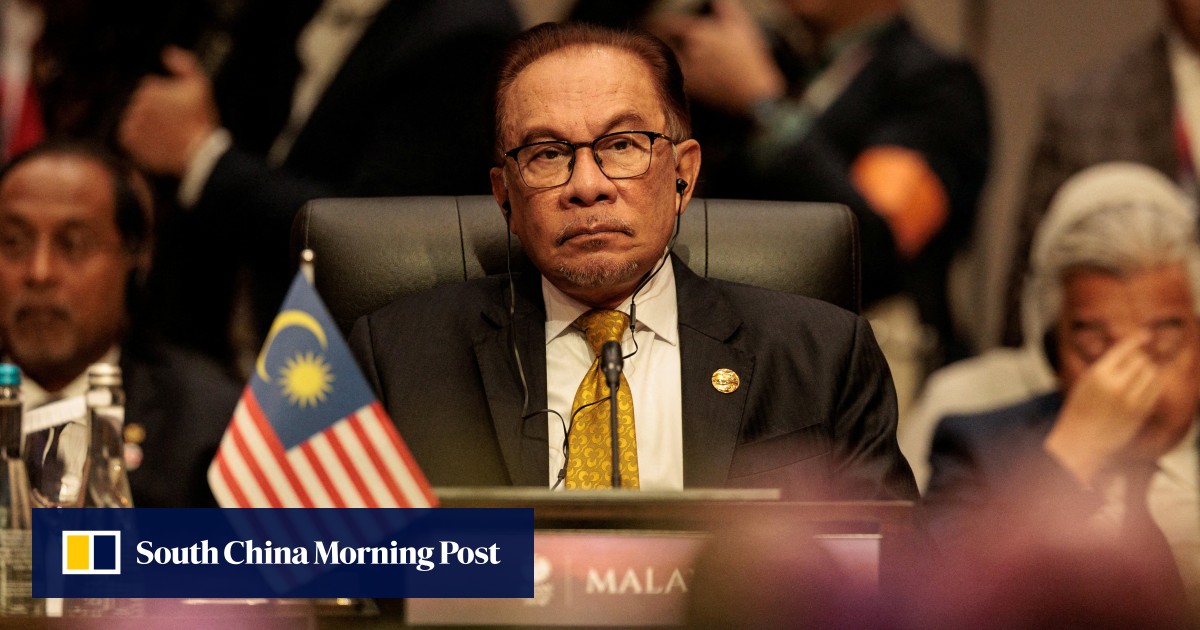Moody’s Investors Service echoed Abang Johari’s concerns about the economic impact of the political turmoil. In a January 16 report, Moody’s said, “Entrenched concerns around the stability of the unity government risks fomenting negative investor perceptions of Malaysia’s political risks and policy gridlock, hampering the country’s longer term economic competitiveness.”
‘Nothing’s been done’: has Malaysia’s Anwar lost momentum to make reforms?
‘Nothing’s been done’: has Malaysia’s Anwar lost momentum to make reforms?
The tumult has weighed on Malaysia’s currency, with the ringgit the worst performing currency since the start of 2023 among emerging markets in Asia. It hasn’t reversed that slide in 2024, falling 2.9 per cent against the dollar this month.
Support for Anwar also tumbled to 50 per cent late last year from 68 per cent in December 2022. About 43 per cent of respondents said they were dissatisfied with the economy, up from 19 per cent soon after he took power.
But with Anwar staving off his political opponents for now, the partnership Abang Johari has established with the federal government has been a boon for Sarawak and its population of about 2.8 million. The state premier said he’s pressing ahead with plans for Sarawak to own its own bank, port and airline, while providing free tertiary education for locals.
Sarawak is the only state in Malaysia with a majority non-Muslim population.
In the interview, Abang Johari said he’s happy with how Anwar has dealt with Sarawak, having facilitated the transfer of Bintulu port, northeast of Kuching, to the state and backed Sarawak’s takeover of Malaysia Airlines’ subsidiary, MASWings – a move that will make Sarawak the first Malaysian state with its own airline.
Abang Johari said the airline is a strategic asset for the state, which wants to see airfares stabilise to help boost travel to Borneo, an island divided between Malaysia, Indonesia and Brunei.
“We are an island, you have to fly,” he said. “If we don’t stabilise the price, then we are in a difficult situation.”
Sarawak also looks set to finalise a deal to have its own bank in the coming days. Abang Johari said there is a “bank on the market” and that an effort to seek regulatory approvals for a takeover are under way.
Federal power is quite weak … They [the authorities in Sarawak] are using the weakness to gain more power
Affin Bank, previously reported as being the lender of interest to Sarawak, has announced a special briefing with Abang Johari in Kuala Lumpur on Tuesday. The bank is majority-controlled by the Armed Forces Pension Fund.
“Sarawak used to have banks,” he said. “Then they were all absorbed into bigger, centralised banking groups. We don’t have a banking instrument to boost our small and medium enterprises.”
Abang Johari has been adept at flexing his influence, said University of Malaya’s Awang Azman.
“Federal power is quite weak,” he said. “They are using the weakness to gain more power.”
Despite the emphasis on Sarawak’s autonomy, Abang Johari said his state remains committed to Malaysia.
After Sarawak was recognised as a high-income state by the World Bank last year, Abang Johari said his next challenge is to boost incomes in rural areas, where poverty rates remain high. As part of that effort, he said that starting in 2026, Sarawak will provide free tertiary education for locals studying in Sarawak-owned universities – a first for a Malaysian state.
The son of Sarawak’s first governor, Abang Johari has had a role in every administration since 1982. Yet beyond being an influential voice in national politics, he never sought a formal role in the federal government.
He moved quickly in 2018, when the ruling Barisan Nasional coalition lost federal power for the first time since independence. He led his Sarawak-based alliance out of Barisan and rebranded it as a regional power, emphasising a “Sarawak First” theme. His GPS coalition now controls 80 of 82 state assembly seats – a feat that Sarawak’s longest tenured chief minister, Abdul Taib Mahmud, didn’t manage to achieve in 33 years in power.
Malaysian coffee farmers hope to draw tourists to Borneo region
Malaysian coffee farmers hope to draw tourists to Borneo region
And while Sarawak’s economy under Taib was oriented toward heavy industries, logging and fossil fuels, Abang Johari – whose government changed the title of his role to premier from chief minister – says he is trying to shift the state toward new energy sources, attracting talent and putting less emphasis on forestry.
“His time is different, my time is different,” Abang Johari said of Taib, who retired this month at age 87.

